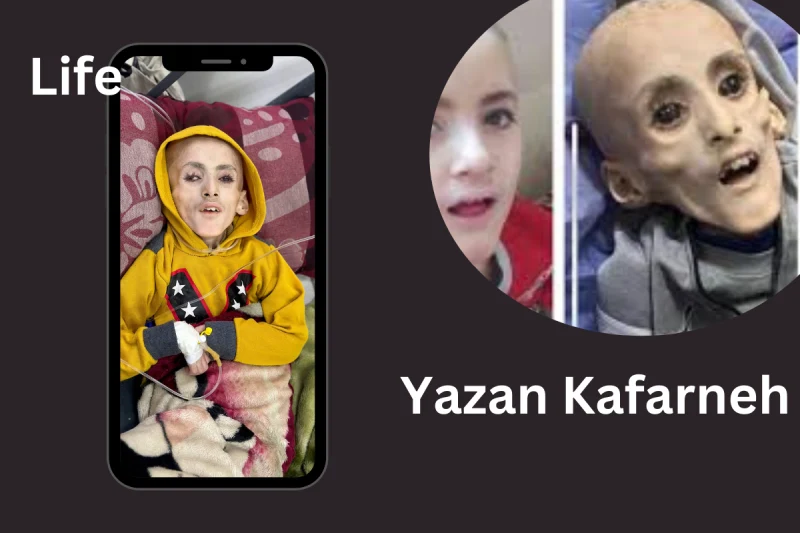In the heart of Gaza—a region marred by conflict and hardship—stories of unimaginable loss often remain unheard. One such story is that of Yazan Kafarneh, a young soul whose life was tragically cut short due to starvation. His story stands as a stark reminder of the human cost of a humanitarian crisis that has gripped Gaza for far too long. Today, we remember Yazan not only to honor his memory but also to shed light on the ongoing suffering of countless innocents caught in a relentless struggle for survival.
The Tragic Reality of Gaza
Gaza, a narrow strip of land bordered by conflict and isolation, has long been a symbol of a humanitarian crisis. Decades of political turmoil, economic blockade, and recurring violence have left its population in a state of perpetual vulnerability. Amid these conditions, access to essential resources like food, clean water, and medical care has become a constant struggle for its people.
The plight of Gaza’s residents is a multifaceted tragedy. The blockade imposed by neighboring states and compounded by internal strife has crippled the economy, leaving many without stable employment or a reliable source of income. With infrastructure in ruins and humanitarian aid stretched thin, the everyday reality for many is one of uncertainty and fear. It is within this context that the heartbreaking story of Yazan Kafarneh unfolds—a narrative that symbolizes the immense human cost of a protracted crisis.
Yazan Kafarneh: A Life of Unfulfilled Potential
Yazan Kafarneh was more than just a statistic in the ongoing tragedy of Gaza; he was a young individual with dreams, hopes, and potential. Born into a world where survival was an everyday challenge, Yazan’s life was defined by the struggle against overwhelming odds. Yet, despite the adversities, there was a light in his eyes—a spark of resilience that promised a future of possibilities.
Family and community often remember Yazan for his gentle spirit and the promise he embodied. His laughter, his aspirations to study and grow, and the small moments of joy he shared with his loved ones painted a picture of a life that could have blossomed into so much more. Unfortunately, like so many others in Gaza, Yazan’s story took a devastating turn. Starvation, a direct consequence of a failing system and dire circumstances, claimed his life, leaving behind a void that is felt not just by his family, but by an entire community longing for change.
Starvation: The Silent Killer
Starvation in Gaza is not an isolated incident but rather a symptom of a much larger crisis. When a society is deprived of adequate resources, the most vulnerable—children and young adults—are the first to suffer. Malnutrition and hunger not only rob individuals of their potential but also weaken communities over generations. For Yazan, starvation was the cruel hand that ended a promising life too soon.
The impact of starvation extends far beyond the physical loss of life. It erodes hope, undermines the foundation of communities, and perpetuates a cycle of despair. In Gaza, where every day can be a battle for basic survival, the tragic fate of Yazan serves as a potent reminder of the urgent need for humanitarian intervention. His story is a call to the international community to address the structural failures that allow such suffering to continue.
The Human Cost of Inaction
When we reflect on the loss of Yazan Kafarneh, it is impossible not to consider the broader implications of a crisis that has claimed countless lives. Every statistic represents a human story—a child who could have been a leader, a family that has been torn apart, a future that will never be realized. The inaction of the global community in addressing the humanitarian crisis in Gaza not only prolongs the suffering of its people but also undermines the very principles of human dignity and justice.
Yazan’s death is emblematic of the deep-seated issues that plague the region. It raises pressing questions about international responsibility and the effectiveness of current measures to protect the vulnerable. As we remember his life, we must also confront the systemic failures that allowed such a tragedy to occur. Only by addressing these root causes can we hope to prevent further loss and build a future where no young life is wasted to hunger and neglect.
The Role of the International Community
The tragic story of Yazan Kafarneh should serve as a catalyst for global action. Humanitarian crises, like the one in Gaza, demand a coordinated response from the international community. Governments, non-governmental organizations, and individual citizens all have a role to play in providing relief and pushing for long-term solutions that address the underlying issues.
Efforts must go beyond temporary aid. While food distributions and emergency interventions are critical, they are not sufficient to solve the systemic problems that lead to such tragedies. Sustainable development, political engagement, and the lifting of economic blockades are essential steps toward ensuring that communities in Gaza can rebuild and thrive. Yazan’s memory must inspire a renewed commitment to these ideals—a commitment to creating conditions where every child has the opportunity to grow, learn, and live free from the specter of starvation.
The Emotional Impact on Families and Communities
For the families left behind, the loss of Yazan is a wound that time may never fully heal. His passing is a stark reminder of the fragility of life in a place where even the most basic needs are uncertain. Grieving families are not just mourning a beloved child or sibling; they are mourning the loss of a future—a future filled with possibilities that were cruelly snatched away.
Communities in Gaza share in this collective sorrow. The death of one young life reverberates through the hearts of many, reinforcing the harsh reality of life under siege. Yet, in the midst of despair, there is also a powerful resolve. The memory of Yazan fuels a determination among his community to seek justice, to demand that their voices be heard, and to hold those responsible for systemic neglect accountable. His story, while deeply tragic, becomes a rallying cry for change—a call to ensure that no other family endures the pain of losing a loved one to preventable hunger.
Remembering Yazan: A Call for Action
As we remember Yazan Kafarneh, we are reminded that his life—though tragically short—carries a profound message for the world. His story is a testament to the devastating impact of neglect and the urgent need for systemic change. It is a call for the international community to stand in solidarity with the people of Gaza and to take decisive steps to end the cycle of suffering.
Honoring Yazan’s memory means more than mourning his loss; it means actively working to create a future where all children have the right to food, health, and dignity. It calls on us to advocate for policies that prioritize humanitarian aid, sustainable development, and human rights. By transforming our grief into action, we can help ensure that the sacrifice of young lives like Yazan’s is not in vain.
The Legacy of Yazan Kafarneh
The legacy of Yazan Kafarneh is one that will continue to resonate as long as the humanitarian crisis in Gaza persists. His story, marked by loss and heartbreak, serves as a reminder of the urgent need for change. While we cannot bring him back, we can honor his memory by striving to build a world where every child’s future is secure, where hunger is a relic of the past, and where justice prevails for all.
In the remembrance of Yazan, let us also recognize the resilience and strength of the people of Gaza. Despite overwhelming challenges, they continue to hope, to fight, and to dream of a better tomorrow. Yazan’s life and untimely death remind us of the collective responsibility we share in supporting these communities—ensuring that every effort is made to prevent further tragedies.
Conclusion
The heartbreaking story of Yazan Kafarneh—a young life lost to starvation in Gaza—is a sobering reminder of the cost of inaction in the face of humanitarian crises. His memory stands as both a symbol of the suffering endured by countless innocents and a call to the international community to address the systemic issues that lead to such tragedies.
As we remember Yazan, we must also renew our commitment to justice and human dignity. His legacy challenges us to transform sorrow into meaningful action—demanding sustainable solutions, advocating for the vulnerable, and working tirelessly toward a future where no more lives are lost to preventable causes.
In honoring Yazan Kafarneh, let us ensure that his story serves as a beacon for change. May his memory inspire us to fight for a world where every child is guaranteed the basic rights of food, healthcare, and hope—a world where tragedies like his become a thing of the past, and every life is valued and protected.
By reflecting on his life and the deep pain caused by starvation in Gaza, we are called to remember that behind every statistic lies a human story. Let Yazan’s memory drive us to create lasting, positive change, so that his legacy—and that of countless others—continues to remind us of our shared responsibility to protect the most vulnerable among us.



